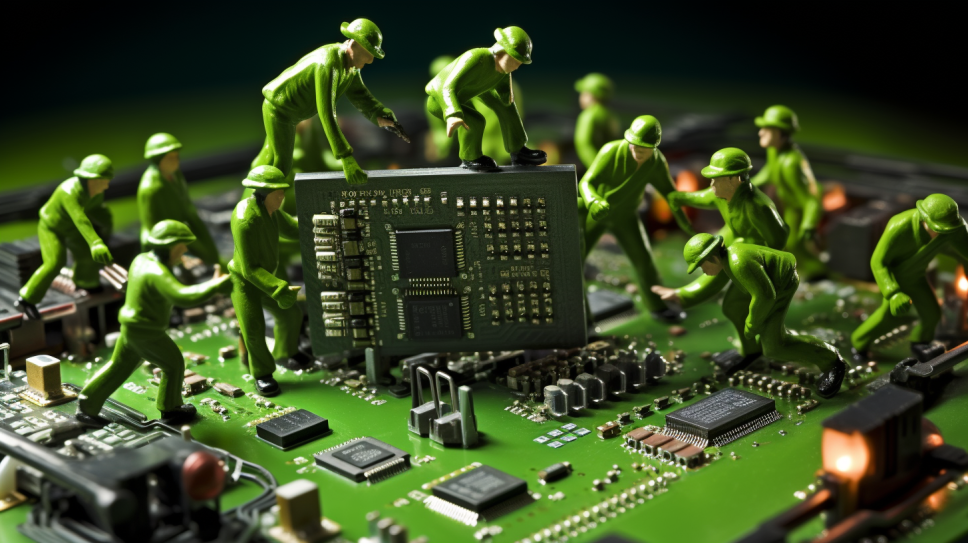November 14, 2023
The Biden administration is desperately trying to halt the outflow of US-made semiconductors, aka chips, to China.
Chips have always been key to each country’s economy — a still-nagging chip shortage has led to manufacturing holdups for new cars, video game consoles, and home appliances since early 2020. But higher-powered chips are also necessary in the race toward superior artificial intelligence capability. It’s a situation that could lead to major ramifications for both consumer tools and military technology. The United States still maintains an edge over China, but the stakes feel higher than ever.
Last year, the US Commerce Department under President Joe Biden issued new rules restricting exports of certain “advanced computing chips” and manufacturing equipment to China. Assistant Secretary of Commerce for Export Administration Thea D. Rozman Kendler warned that China’s investment in powerful chips was proof that it aims to become a “world leader in artificial intelligence by 2030,” thereby boosting its surveillance and military capabilities. “Our actions will protect US national security and foreign policy interests while also sending a clear message that US technological leadership is about values as well as innovation,” she said.
A clear imperative: Restrict China’s access to good quality chips and contain their military capabilities.
US chipmakers continued, however, to find ways to get their products into China. NVIDIA, the de facto leader in US chipmaking known for its powerful graphics processors, became a trillion-dollar company in May. Chinese firms had placed $5 billion worth of orders for lower-powered NVIDIA chips still allowable under the old rules, but it appears many of those orders were canceled after the US issued an update to plug this loophole.
Last month, the US Commerce Department expanded its list of banned chips and manufacturing equipment to thwart these US-to-China sales. Under the new rules, only lower-capacity chips can be sold to Chinese firms. It also prohibited sales of chips to a new roster of countries it claims serve as pass-throughs for Chinese companies. Given 30 days to halt its shipments, NVIDIA reportedly stopped before the deadline.
But according to new reporting by the Financial Times, NVIDIA is developing three new chips with moderated performance levels specifically to comply with the new regulations and sell to China. It’s the clearest sign yet that Biden is engaged in a cat-and-mouse game with US semiconductor companies, comfortable with razor-thin compliance standards in a lucrative industry.
China’s market will always attract US chipmakers, says Jim Lewis, senior vice president at the Center for Strategic and International Studies, a foreign policy think tank. “The only way to stop the sales is to embargo any chip export to China instead of fussing around with export thresholds,” he says. “NVIDIA is playing hardball, and the administration is stuck. If they play hardball back, it could harm the US chip lead, but if they don't, NVIDIA and others will keep looking for loopholes.”
Xiaomeng Lu, a director in Eurasia Group’s geo-technology practice, is eager to see how the US government’s relationship with NVIDIA progresses. “The company’s behavior has become very annoying to US government officials who are trying to revise their rules once and twice, but it feels like the company is still interested in sneaking around the rules,” she says. “There will be a tussle between the two, and it’ll be interesting to see the regulatory power versus the commercial champion. Who will win this game?”
Lu is also watching to see if the US bans cloud-based access to graphics processors, which would close another loophole for chipmakers seeking access to restricted foreign markets. While NVIDIA is the largest US chipmaker, and the most eager to adapt to changing regulations, other manufacturers are surely watching and could follow suit.
Meanwhile, China is playing nice on the world stage, signing onto an agreement to avert the catastrophic risks of AI brokered by British Prime Minister Rishi Sunak earlier this month. While Sunak earned points for getting China to commit to anything, Beijing merely signed onto “loosely organized slogans” and a nonbinding agreement, Lu says. “Both sides got what they wanted.”
The export restrictions will also push China to look elsewhere. Lewis says that while Biden’s export controls have been successful so far, it’s also inspired the Chinese to “supercharge their chip investments” and shrug off their dependence on the US. Baidu, for example, ordered chips from Huawei this year, a sign that the Chinese tech sector may be becoming less reliant on NVIDIA and US-made chips.
The US should be careful, says Lewis, not to slow its chipmakers’ progress while curbing China’s capabilities. “It’s more important that the US accelerate its own AI development, since China will be hard to stop,” he adds. “The US leads in AI so the main issue is not doing something to mess that up, like creating regulatory hurdles for imaginary risks.”
More For You
Tune in on Saturday, February 14th at 12pm ET/6pm CET for the live premiere of our Global Stage from the 2026 Munich Security Conference, where our panel of experts takes aim at the latest global security challenges.
Most Popular
- YouTube
In this Quick Take, Ian Bremmer weighs in on the politicization of the Olympics after comments by Team USA freestyle skier Hunter Hess sparked backlash about patriotism and national representation.
British Prime Minister Keir Starmer delivers a speech at Horntye Park Sports Complex in St Leonards, Britain, February 05, 2026.
Peter Nicholls/Pool via REUTERS
In July 2024, Keir Starmer won the United Kingdom’s election in a landslide. It has been downhill ever since, with Starmer’s premiership sullied by economic stagnation, intraparty fighting, and a lack of vision for the country.
© 2025 GZERO Media. All Rights Reserved | A Eurasia Group media company.
